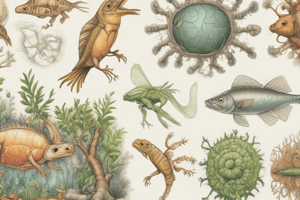Podcast
Questions and Answers
What are the 3 domains of life?
What are the 3 domains of life?
- Viruses, Bacteria, and Fungi
- Plants, Animals, and Fungi
- Bacteria, Archaea, and Eukarya (correct)
- Prokaryotes, Eukaryotes, and Archea
How are organisms placed in domains and kingdoms?
How are organisms placed in domains and kingdoms?
Based on their cell type, their ability to make food, and the number of cells in their bodies.
Describe Domain Bacteria.
Describe Domain Bacteria.
They are prokaryotes, found all around, can be autotrophs or heterotrophs, harmful or helpful, give vitamins and nitrogen, and are unicellular.
What are prokaryotes?
What are prokaryotes?
What is a nucleus?
What is a nucleus?
What are nucleic acids?
What are nucleic acids?
Describe Domain Archaea.
Describe Domain Archaea.
Describe Domain Eukarya.
Describe Domain Eukarya.
What are Protists?
What are Protists?
What are Fungi?
What are Fungi?
Describe Plants.
Describe Plants.
Describe Animals.
Describe Animals.
Flashcards are hidden until you start studying
Study Notes
Domains of Life
- Three domains: Bacteria, Archaea, and Eukarya.
Classification Criteria
- Organisms are classified based on cell type, food-making ability, and number of cells.
Domain Bacteria
- Comprises prokaryotic organisms found in diverse environments.
- Includes both autotrophs (organisms that produce their own food) and heterotrophs (organisms that consume others).
- Most are beneficial, aiding in processes such as vitamin and nitrogen production.
- Primarily unicellular in structure.
Prokaryotes
- Cells that do not possess a nucleus.
Nucleus
- A dense area within a cell that contains nucleic acids.
Nucleic Acids
- Chemical substances that provide instructions for cellular activities.
Domain Archaea
- Consists of tiny, unicellular prokaryotes often found in extreme environments, such as hot springs.
- The term "Archaea" derives from Greek, meaning "ancient."
- Includes both autotrophs and heterotrophs; distinct from bacteria due to unique chemical characteristics.
Domain Eukarya
- Encompasses eukaryotic organisms with nuclei in their cells.
- Divided into four kingdoms: Protista, Fungi, Plantae (Plants), and Animalia (Animals).
Kingdom Protista
- Comprised of diverse eukaryotic organisms that don't fit into animal, plant, or fungi categories.
- Members can be autotrophs or heterotrophs, with most being unicellular and some, like seaweed, being multicellular.
Kingdom Fungi
- Multicellular eukaryotes that include organisms like mushrooms, molds, and mildew.
- A few unicellular members, such as yeast, are also included.
- All fungi are heterotrophs, often decomposing dead organisms for nourishment.
Kingdom Plantae (Plants)
- Consists of multicellular organisms that are exclusively autotrophic.
- Serve as a primary food source for heterotrophic organisms, offering significant ecological variety.
Kingdom Animalia (Animals)
- Composed entirely of multicellular organisms that are heterotrophic.
- Adaptations facilitate finding, capturing, and digesting food.
- Animals inhabit multiple environments across the globe.
Studying That Suits You
Use AI to generate personalized quizzes and flashcards to suit your learning preferences.




